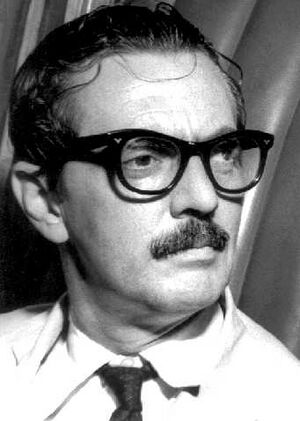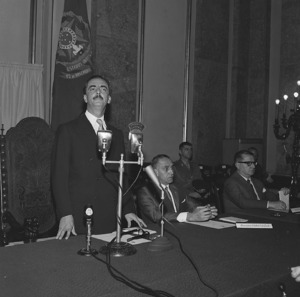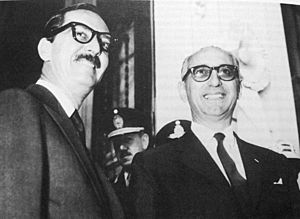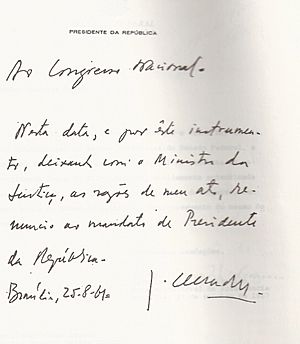Jânio Quadros facts for kids
Quick facts for kids
Jânio Quadros
|
|
|---|---|
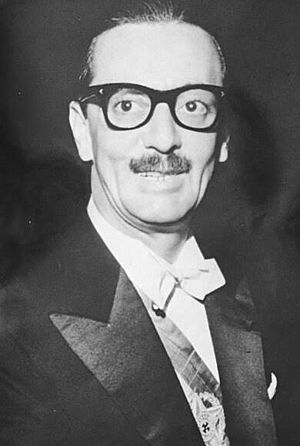 |
|
| President of Brazil | |
| In office January 31, 1961 – August 25, 1961 |
|
| Vice President | João Goulart |
| Preceded by | Juscelino Kubitschek |
| Succeeded by | Ranieri Mazzilli (interim) |
| Mayor of São Paulo | |
| In office January 1, 1986 – December 31, 1988 |
|
| Vice Mayor | Arthur Alves Pinto |
| Preceded by | Mário Covas |
| Succeeded by | Luiza Erundina |
| In office April 8, 1953 – January 31, 1955 |
|
| Vice Mayor | Porfírio da Paz |
| Preceded by | Armando de Arruda Pereira |
| Succeeded by | William Salem (interim) |
| Member of the Chamber of Deputies | |
| In office August 1, 1960 – November 1, 1960 |
|
| Constituency | Paraná |
| In office February 2, 1959 – February 3, 1959 |
|
| Constituency | Paraná |
| Governor of São Paulo | |
| In office January 31, 1955 – January 31, 1959 |
|
| Vice Governor | Erlindo Salzano |
| Preceded by | Lucas Nogueira Garcez |
| Succeeded by | Carvalho Pinto |
| Member of the Legislative Assembly of São Paulo | |
| In office March 14, 1951 – April 7, 1953 |
|
| Constituency | At-large |
| Member of the Municipal Chamber of São Paulo | |
| In office May 8, 1947 – March 14, 1951 |
|
| Constituency | At-large |
| Personal details | |
| Born |
Jânio da Silva Quadros
January 25, 1917 Campo Grande, Mato Grosso, Brazil |
| Died | February 16, 1992 (aged 75) São Paulo, São Paulo, Brazil |
| Political party |
|
| Spouse | Eloá Quadros |
| Alma mater | University of São Paulo |
| Signature | |
Jânio da Silva Quadros (January 25, 1917 – February 16, 1992) was a Brazilian lawyer and politician. He became the 22nd president of Brazil in 1961. He served as president from January 31 to August 25, 1961, when he suddenly resigned.
Before becoming president, Jânio Quadros was also the mayor of São Paulo twice. He also served as the governor of the state of São Paulo. People knew Quadros for his unique way of governing. He was seen as honest and had a very unusual style.
As president, he wanted to fix Brazil's economy and stop corruption. He also wanted Brazil to be friends with many different countries. He tried to balance relationships with the United States and communist countries. Even though many people voted for him, his time as president was short and full of problems. His unexpected resignation caused a lot of confusion in Brazil.
Contents
Early Life and Education
Jânio Quadros was born in Campo Grande, Mato Grosso do Sul, on January 25, 1917. His parents were Gabriel Quadros and Leonor da Silva Quadros. He went to the University of São Paulo to study law.
To pay for his studies, he taught geography and Portuguese. He finished his law degree in 1939. After graduating, he worked as a lawyer and a teacher until 1945. That's when he decided to get involved in politics.
Starting a Political Career
In 1947, Quadros was elected to the city council of São Paulo. He was a very active member and helped create many new laws. In 1953, Quadros ran for mayor of São Paulo. He won against a very strong candidate, Francisco Cardoso.
He was mayor until 1955. During this time, he became known for being honest and coming up with new ideas. He often visited poor areas of São Paulo to listen to people's problems. This made him very popular with working-class families. He also managed to balance the city's budget in less than a year. This made his reputation even stronger.
In 1955, Quadros left his job as mayor to run for governor of the State of São Paulo. He won against Adhemar de Barros, a politician he had competed with for a long time. He served as governor until 1959. Then, he resigned to run for president.
Quadros became famous very quickly because he used a "populist" style. This means he spoke directly to ordinary people and promised to fix their problems. His campaign symbol was a broom. He said he would "sweep away corruption" from the government. He was also a very charming leader. People trusted him easily.
The 1960 Presidential Election
Before the 1960 election, several opposition parties chose Jânio Quadros as their candidate. These parties included his National Labor Party (PTN) and the Christian Democratic Party. The largest opposition party, the National Democratic Union (UDN), also supported him.
Quadros was very popular with Brazilian voters. The ruling parties chose Henrique Lott, a marshal in the Brazilian army, as their candidate. However, Lott was not as popular. Quadros won the election easily. His victory margin was the largest for a presidential election decided by popular vote until 1994.
Quadros received 48% of the popular vote. This was more than any president before him. However, the vice president elected was João Goulart, who was Lott's running mate. They were from different parties.
This election was a big moment in Brazilian history. When Quadros took office on January 31, 1961, it was the first time since 1889 that power was peacefully given to an elected opposition leader. It was also the first time in 31 years that the president was not connected to the legacy of Getúlio Vargas.
Presidency
After winning the 1960 election, Quadros spent three months traveling in Europe. He didn't talk much about what he would do as president. Many of his supporters thought he should have been more involved in preparing his government.
Quadros became president on January 31, 1961. In his first speech, he talked about government problems, rising prices (inflation), and debt. He blamed the previous president, Juscelino Kubitschek, for these issues. Quadros quickly replaced most of the government ministers with people from parties that had supported him.
However, Quadros faced challenges because he was new to party politics. He also had a small staff. This made it hard for him to govern effectively.
Domestic Policies
When Quadros became president, Brazil had high inflation and owed a lot of money to other countries. In March, his government announced a plan to fight inflation. This plan included simplifying exchange rates and cutting government spending. These changes were approved by the International Monetary Fund (IMF).
Quadros was able to renegotiate Brazil's debts with the United States and European countries. Brazil received new loans totaling 1.64 billion dollars. This greatly helped with the debt crisis. It was a big success for Quadros, as previous presidents had failed to do this.
Besides fighting inflation, Quadros also tried to reduce government inefficiency and corruption. He started an anti-corruption campaign. He often made decisions through presidential decrees, bypassing the usual government process. However, these actions lowered morale within the government. They also upset many members of Congress. Quadros rarely asked his allies for their opinions. He held only two cabinet meetings in his first month.
As president, Quadros also spent time on less important issues. For example, he worked hard to make gambling illegal. He also tried to ban women from wearing bikinis on the beach.
Foreign Policies
Quadros wanted Brazil to have an independent foreign policy. He said his main goals were "freedom, independence, and non-interference." He also tried to build closer relationships with countries in Africa. He hoped to gain influence in the non-aligned movement. This movement included countries that did not side with either the US or the Soviet Union during the Cold War.
He tried to show support for newly independent African countries. He promoted decolonization and spoke out against racism. He also worked to increase trade and cultural exchanges with these nations. However, his government sometimes supported countries ruled by white minority governments, like South Africa. This made his efforts seem less sincere.
Quadros wanted Brazil to be neutral in world politics. He didn't want to follow the pro-American policies of past presidents. He hoped to play the major world powers against each other. However, his willingness to be friendly with communist governments like Cuba, China, and the Soviet Union upset many of his supporters. This was especially true for the UDN party.
His decision to give Brazil's highest medal for foreigners, the Cruzeiro do Sul, to Che Guevara was very controversial. Many people suspected he was a communist supporter. Quadros's foreign policy was one of the most debated parts of his presidency. It was a major reason why he lost support in Congress.
Resignation
In the summer of 1961, Quadros faced more and more opposition from Congress. He had also upset many of his former allies. On August 25, 1961, he suddenly resigned. In his mysterious resignation letter, he mentioned "terrible occult forces."
Many people believe that he resigned to gain more power. Quadros likely expected that the people or Congress and the military would ask him to return. He probably thought his resignation would not be accepted. This was because his vice president, João Goulart, was not popular with the military and other conservative groups.
However, the National Congress of Brazil immediately accepted Quadros's resignation. They asked the president of the Chamber of Deputies of Brazil, Pascoal Ranieri Mazzilli, to take over temporarily. This was until Vice President João Goulart could return from his trip to China.
Quadros's resignation caused a serious political crisis. It set the stage for the 1964 military coup. The military was worried about Goulart's leftist views. They seemed ready to stop him from becoming president by force. The United States was also concerned about Goulart and thought about supporting anti-Goulart groups.
Goulart finally became president on September 7, 1961. However, his power was limited by a new law. This law created a parliamentary system of government. Goulart was not from the same party as Quadros. At that time, Brazilians could vote for a president and a vice president from different parties.
Life After the Presidency
Soon after he resigned, Quadros left the capital and traveled to Europe. He promised to return to Brazil. The political crisis he started led to a military coup in 1964. The military did not allow him to participate in politics for some time.
However, by the 1980s, Quadros made a comeback. He joined the Brazilian Labor Party. In 1982, he ran for governor of São Paulo but lost to André Franco Montoro. Despite this, he was elected mayor of São Paulo again in 1985. He defeated Fernando Henrique Cardoso, who later became president of Brazil. Quadros served as mayor until 1988.
Personal Life
Jânio Quadros married Eloa do Valle in 1939. His daughter, Dirce, became a member of the Brazilian National Congress.
He passed away on February 16, 1992, at the Albert Einstein Hospital in São Paulo. He had been in the hospital for 12 days and died from kidney and lung failure and a hemorrhage.
See also
 In Spanish: Jânio Quadros para niños
In Spanish: Jânio Quadros para niños
- List of presidents of Brazil
- 1964 Brazilian coup d'état
- Janismo


